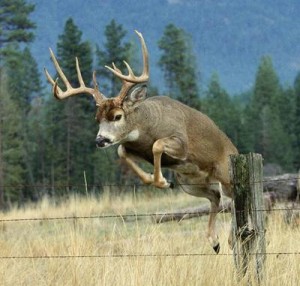Deer Resistant Plant list and comments on controls used in reducing the deer population in your garden.
Deer are often times very selective in what they eat. Their predation depends availability and palatability. Hence my own control of spraying my plants with a cayenne pepper spray. HACHOO — now I will find myself developing a strain that likes Mexican. Other methods of deterring them will all depend upon the availability of alternative foods, weather conditions, and nutritional needs.
If they find what they need in your garden, they will stay! In drought cycles or severe winters they will visit your garden all the more and the term selective will have no meaning at all. In a severe drought condition in California I have observed them eating Eucalyptus … much less many of the other plants I have listed. Overpopulation and lack of natural predators is another reason for their fearlessness.
Some people welcome these animals, but to me they are four- footed scourges. Their predation mangles good pruning, destroys the productive vegetable garden and in severe overpopulation’s they destroy simply by trampling everything in their path. Today I am struggling with an ineffective 6-8 ft. fence and their presence has destroyed a once beautifully pruned orchard. After raising the fence I am now faced with the encroaching appearance of an ELK herd numbering some one hundred!
Controls range from planting native and or resistant plants to electric fences or well constructed fences. Some will work and others will not.
The following list of deer proof plants is a helpful tool if only the deer would read the same lists.
Many plants such as viburnums and chaenomeles get browsed on enough that the plants rarely require pruning . Then again, many include them as deer resistant plants.
Your own comments in a discussion of this article, especially on methods you have used to control them would be nice! Hints
CONTROLS: Most effective!
1. FENCING:
Usually a well constructed six-foot fence is considered an effective barrier. Having a second fence built within the first about some five or six feet will add some extra protection. This fence need not be as high … sturdy shrubs may also be used to a similar purpose.
The higher the fence the better, eight foot fences seem to be the best choice, then again when frightened (or being chased by a two footed scourge) I have seen deer clear that fence without even hitting a hoof. Attaching 2-3 ft. outriggers at a 45 degree angle will also help deter their jumping the fence. Hot wiring this single line will do much to prevent their entry into one’s garden.
Always make sure that your fences are tightly built and that the foundation posts are well anchored, and if made of different materials (say chicken wire) that pockets do not exist to be slipped between.
2. NEW TECHNOLOGIES:
Your input please: there are many motion detection systems on the market, some trigger noise makers, others trigger impact sprinklers. I have not used any of them … so if you have had some experience with these systems, please let the rest of us know as to how it worked, or did not.
Neem Oil Pure conjecture but I have been using this product to kill mealybugs and scale in an orchid house. It works by making the plant tissues unpalatable to insects. If it works for insects would it deter deer? An experiment waiting to be tested. As for the other “SPRAYS” it too would be affected by rainfall.
3. DOGS: Your dog may be trained to guard your garden. Their marking of your property may well deter the deer from entering. I used to have an Australian Shepard and she would herd the creatures until they were fit to be tied. For years I had no problems until I lost her in an accident. I used to work for a B&B whose hosts loved these four footed locusts and would feed them — while the gardener applied the cayenne. They and their neighbors encouraged a massive overpopulation of sick and scurvy ridden deer. These same people, so aghast at my efforts to deter them (thirteen two years ago), would have no qualms about poisoning the coyotes that culled out the sick or young. I wish more people would encourage and feed the coyotes to stay nearby than the deer!
4. NETTING: This is a temporary solution, but the black netting sold to deter birds can be used to cover new plantings. Use of netting as a fence is less adequate as it is hard to tighten and can be lifted or crushed in the jumping over.
5. SPRAYS: Here in the Northwest Sprays products such as Hinder, Deer-Away and homemade concoctions such as my capsicum and eggs are less than effective, as they often need to be re-applied after every rain. Considering our 30-40 hours of sunshine in November this is a method best used in the summer months.
6.SCENTS The old visit your barber routine, human hair, human urine, predator urine or droppings. A link to companies selling lion dung – DUNGONIA, Irish Spring soap, dried blood or lion dung collected and hung in a cloth bag. (or smelly sock) My own personal experience can be found at the bottom of (HINTS)
All of these controls may work and provide some seasonal control. In most cases the effect is temporary, so rotating the controls will be helpful. A list of plants you might consider.



